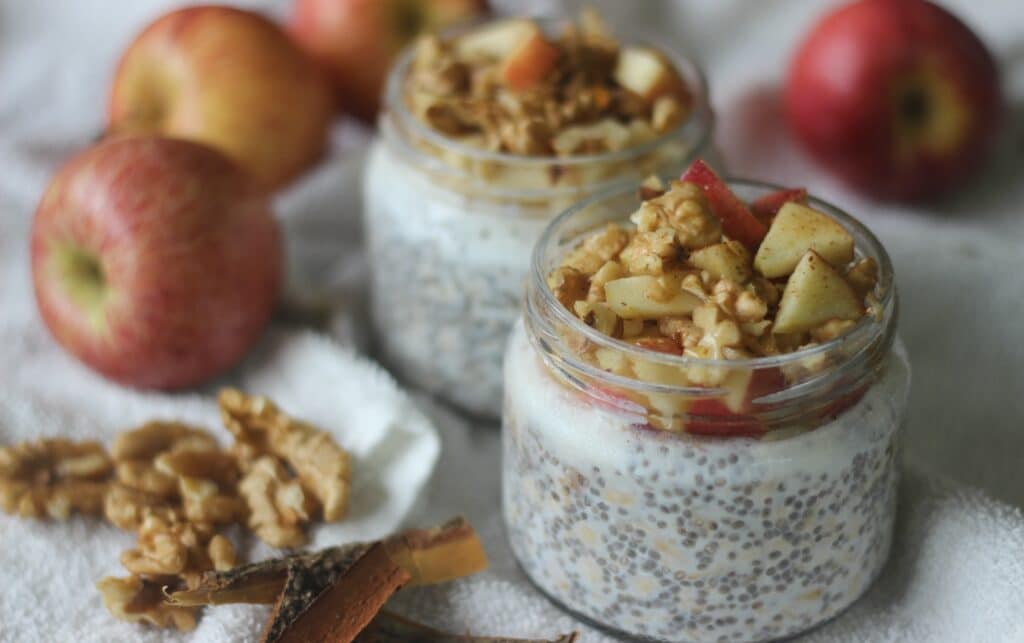2024 has given us all a very unlikely social media superstar: Cottage cheese. And it’s not just online hype. In 2024, MyFitnessPal users logged cottage cheese 35% more times than they did in 2023.
So far this year, a whopping 7 million pounds of cottage cheese have been logged by MyFitnessPal users around the world!
Influencers are using this retro ingredient to make flatbread, pizza, and even fudge. The curds have morphed from a plain-Jane food you eat to lose weight and build muscle to the must-have ingredient of the moment.
All this culinary creativity is happening because people know they need to get enough protein. Protein helps you feel full longer and hold onto lean muscle even as you lose weight.
Cottage cheese is practically synonymous with protein—about 25 grams per cup—but this versatile dairy product offers more than just protein. We got the nutrition scoop on cottage cheese, plus tips for incorporating it into your diet by MyFitnessPal registered dietitian Stephanie Tarnacki.
1. It’s a Probiotic Powerhouse
Probiotics are beneficial bacteria that play a crucial role in maintaining gut health.
Just like yogurt, cottage cheese can be a good source of probiotics. Just be sure to seek out a brand that says it contains “live and active cultures” on the label, says Tarnacki. “This ensures that there are live bacteria present that can aid in digestive health by increasing the amount of healthy bacteria in your gut microbiome.”
Including probiotic-rich foods in your diet can help improve digestion, boost the immune system, and enhance overall gut health, according to some research.
Dietitian Tip: Try adding a scoop to your morning smoothie, use it as a base for a creamy dip, or simply enjoy it with a sprinkle of fresh berries and a drizzle of honey to add some probiotics to your day. “You can even add it to sweet treats like pancakes and waffles,” says Tarnacki.

2. It May Help Prevent Certain Diseases
Regular consumption of dairy products like cottage cheese has been linked to a lower risk of several chronic diseases, like type 2 diabetes and certain types of cancer, including colorectal cancer, bladder cancer, gastric cancer, and breast cancer. Researchers think it might be due to bioactive compounds and essential nutrients found in dairy.
Studies suggest that dairy’s calcium, vitamin D, and other nutrients may help regulate insulin levels, reducing the risk of type 2 diabetes.
Dietitian Tip: To maximize the possible benefits, Tarnacki recommends pairing your cottage cheese with whole-grain crackers or vegetables. Fiber also helps regulate blood sugar and could potentially help prevent type 2 diabetes.
3. It Can Help for Weight Loss
If you’re on a weight loss journey, low-calorie foods are dietary staples. Low-cal foods with tons of satisfying protein? That’s where cottage cheese can really save the day.
One cup of cottage cheese has just 183 calories and 25 grams of protein, making it a perfect snack or addition to meals without adding a lot of calories. Its high protein content also contributes to a feeling of fullness, helping to curb hunger and reduce overall calorie intake.
Dietitian Tip: To incorporate cottage cheese into a weight loss-friendly diet, consider pairing it with low-cal fruits and vegetables for a nutritious snack. “Opt for the lower fat option to ensure you are getting all the benefits without all the fat,” says Tarnacki.
Fun fact: Did you know MyFitnessPal has one of the world’s largest food databases, with over 19 million foods? Track your protein and more on the app!
Next time you’re strolling the dairy aisle at the supermarket, consider picking up a package or two of cottage cheese to see how it can add variety, nutritional benefits, and (of course) plenty of protein to your daily meals and snacks.
Here are a few shopping tips from Tarnacki for the next time you’re choosing a cottage cheese:
- Choose low-fat or fat-free options if you’re looking to reduce calorie and saturated fat intake.
- Many cottage cheese brands are high in sodium. If you need to limit your sodium intake, opt for “reduced sodium” or “no salt added” varieties.
- Select plain varieties without added sugars, especially when considering flavored options.
- Consider the curd size. This is a matter of personal preference, but small-curd varieties tend to be slightly tangier and more acidic than large-curd options.
Frequently Asked Questions
Can I eat cottage cheese if I’m lactose intolerant?
Cottage cheese is a dairy product, so if you are lactose intolerant or sensitive to dairy it would be best to avoid it to avoid any gastric side effects, according to Tarnacki.
How can I use cottage cheese in recipes?
Tarnacki says that cottage cheese can be used as a substitute for yogurt in baked goods or instead of ricotta in savory dishes. I can also be mixed into eggs, or smoothies for a protein boost.
What is healthier yogurt or cottage cheese?
“Both are great options,” says Tarnacki. Her advice? If you choose yogurt, make sure to go for a low fat, unsweetened version. If you want cottage cheese, aim for a low fat and lower sodium version.
Is it okay to eat cottage cheese every day?
Cottage cheese can be high in saturated fat, notes Tarnacki. As long as the rest of your diet is rich in whole grains, lean proteins, fruits and veggies, cottage cheese can be a great daily option. “Moderation is key to everything.”
Why eat cottage cheese before bed?
“Any time of day is ok to eat cottage cheese,” says Tarnacki.
The Bottom Line
Cottage cheese is more than its protein. Its probiotic benefits, potential association with lowered risk of chronic diseases, and low-calorie content make it a good addition to any diet.

